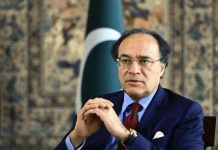PTI founder claims that investigations into May 9 events will unfold if Chief Justice Isa steps down.
Khayam Abbasi
Rawalpindi: Pakistan Tehreek-e-Insaf (PTI) founder Imran Khan has alleged that a constitutional amendments are being pursued to extend the terms of three top officials, including Chief Justice Qazi Faez Isa, Islamabad High Court’s chief justice, and the Chief Election Commissioner.
Speaking to the media at Adiala Jail, Imran claimed that the government, despite losing previous political battles, is now resorting to these amendments to safeguard fraudulent election results and protect officials in power.
“They are amending the constitution to extend the terms of three umpires,” Khan said.
He warned that if Chief Justice Isa is removed, investigations into the May 9 protests and the alleged rigged elections will be launched.
Imran criticised the delay in addressing the May 9 events, accusing the government of trying to dismantle his party.
He pointed out that he had been targeted with over 140 legal cases before May 9, adding that attempts to remove him only intensified after the date.
Imran expressed concern that if the new chief justice takes office, the true events of May 9 will come to light.
He also criticised the government for undermining Pakistan’s judicial and electoral processes and delaying the tribunal decisions on the February 8 election.
Pakistan People’s Party (PPP) Chairman, Bilawal Bhutto Zardari, believes that Justice Mansoor Ali Shah will be the next Chief Justice of Pakistan.
Stressing the need for comprehensive judicial reforms in the country, Bilawal in a televised interview said on Tuesday, “On October 26, Justice Mansoor will become the next chief justice, there’s no doubt about it.”
His remarks come as the current chief justice, Qazi Faez Isa, is set to retire later this year.
The confirmation follows weeks of political uncertainty, as the ruling coalition government postponed plans to table a controversial constitutional amendment package in parliament.
The proposed amendments reportedly included provisions to extend the retirement age for judges, which could have impacted CJP Qazi Isa’s tenure.
However, the delay in presenting the package is attributed to the lack of support from key government ally, Jamiat Ulema-e-Islam-Fazl (JUI-F) leader Maulana Fazlur Rehman.
According to Bilawal, the PPP is keen on introducing reforms, including the creation of a Truth and Reconciliation Commission under the Charter of Democracy, which remains unfulfilled.
“We waited almost 50 years for justice in Shaheed Zulfiqar Ali Bhutto’s murder case,” he added, calling for urgent changes in the judicial system.
He also highlighted that the Supreme Court spends 90% of its time dealing with political cases, despite these making up only 15% of the court’s workload.
Bilawal argued this imbalance was detrimental to justice for ordinary citizens, reinforcing the need for reforms in both the judiciary and the National Accountability Bureau (NAB).
On the political front, Bilawal expressed disappointment over Pakistan Tehreek-e-Insaf (PTI) Chairman Imran Khan’s recent comments, which he said derailed efforts to engage the party on constitutional amendments.
“It is difficult for the government to discuss amendments with PTI along with its input,” he stated.
Despite these challenges, Bilawal emphasised that the PPP would continue drafting its proposal for the creation of a constitutional court, which will be shared with Maulana Fazl.
He acknowledged that efforts are ongoing to reach consensus on a joint draft with the JUI-F, who insist on involving opposition parties, particularly PTI, in the discussion.
With Justice Qazi Faez Isa’s retirement drawing closer, the government has faced mounting pressure to resolve the deadlock and push through its legislative agenda.
However, Bilawal admitted that the ruling coalition still lacks the numbers in parliament needed to pass the proposed constitutional amendments.
Justice Mansoor Ali Shah’s confirmation as the next chief justice comes at a critical time for Pakistan’s judiciary, as debates over judicial independence and political interference continue to dominate public discourse.

















